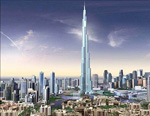Can the United Arab Emirates become the business capital of the world? It’s an accolade within its reach, according to a panel of key figures responsible for driving its growth and global reputation.
The Global Real Estate Debate, the first in a new series from Estates Gazette, hosted jointly with Cluttons at the Capital Club Dubai, brought together the architect of the iconic Emirates Towers, a spokesperson for the expanding Al Maktoum International Airport, the head of Cluttons in the Middle East, and two executives working to entice international firms to its shores.
The panellists told an audience of 150 local business people and a pack of international media how the UAE measured up on the global stage.
Dubai – and the neighbouring emirates, which together make up the UAE – is clear in its ambition to join the top-tier business centres of London and New York. Over the past 15 years it has built sufficient infrastructure to elevate the emirate to its current status as perhaps the most important developing city in the world. Nowhere is this expansion more evident than with its airports.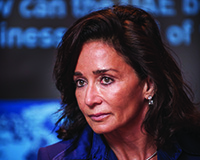
“This year, we’ll have 70m passengers,” Anita Mehra, vice president responsible for marketing with Dubai Airports Group (pictured right), told the audience. “By Expo 2020, we expect 126m and by 2030, 200m passengers. These are not pie-in-the-sky figures. Dubai’s incredible infrastructure has made it so that, logistically, it’s easy for goods and passengers to get to.”
TECOM Investments, part of local giant Dubai Holdings, has similarly ambitious growth plans. Its 11 business parks – including Internet City, which provides space for 4,500 companies and 60,000 knowledge workers – are set to expand their office provision by 3m sq ft this year alone. The growth will also create creative hubs, such as the Dubai Design District.
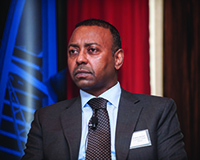 “We have an ambitious plan to be a regional hub for creative communities,” said Badr Al Gergawi, TECOM’s chief executive for development and planning.
“We have an ambitious plan to be a regional hub for creative communities,” said Badr Al Gergawi, TECOM’s chief executive for development and planning.
The Jebel Ali Free Zone, from which such Fortune 500 companies as GM, Dow Chemical and Ford operate, is expected to lure more global firms because their goods enjoy ease of mobility in and out of the zone.
“Capital is flowing around the world and investors choose where it lands,” said Khaled Ahmed, senior vice president responsible for strategy and development at tech and business parks specialist Economic Zones World (pictured left). “Dubai continues to provide many opportunities for that capital.”
One of the Dubai’s biggest advantages is its gateway status: it is built to serve not merely itself, according to Ahmed, but also the 3bn people of Africa, south Asia and the rest of the Middle East. Because EZW operates beyond the UAE, his was a broader view of the region.
“Expansion, and our whole business model, is based on the fact that we are looking at 3bn people and the spending power in their economies,” he said. “If you are a provider of a service or a product, they are the markets you will look at. For that reason, we capitalise on the idea of efficiency, so your people can come to Dubai and service those economies.”
And, like London, Dubai has benefitted from instability elsewhere, especially among its near neighbours. As long as surrounding economies remain “non-business-friendly”, said the panel, Dubai would be the hub that serviced them.
But the emirate has done more than capitalise on turmoil. It has forged its own path, building iconic towers and reclaiming land to expand its limited natural coastline.
That iconic skyline includes the world’s tallest building, the Burj Khalifa, for the panel a testament to the steady hand of the prime minister of Dubai and vice president of the United Arab Emirates, Sheikh Mohammed bin Rashid Al Maktoum.
All well and good. But can the country really mount a serious challenge to more established players in the big league?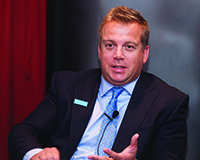
“I think the road is already paved,” said Steve Morgan, chief executive of Cluttons’ Middle East operations (pictured right). “There is a way to go yet and there are going to be some bumps along the way and quite a lot of work to do regarding regulation and, perhaps, modification of the legal framework. But I think that Dubai and the UAE is on that road.”
Morgan praised regulators for intervening to cool the overheating housing market in recent years but warned that regulation should be a last resort. “Big grown-up markets regulate themselves, and I think we are some way away from that,” he said. “So while I think there is an element of regulation that we need for the marketplace, I wouldn’t like to see us interfering in the market too much. It’s a positive, at the moment, but if we’re going to be a truly grown-up market and a global leading market, the market needs to run on its own.”
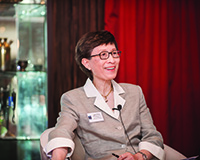 For Hazel Wong (pictured left), executive director of WSW Architects, and designer of the iconic Emirates Towers, it is the skyline that has done much to advance the region’s cause. “Architecture is no longer a product, it’s no longer just where we live,” she said. “You talk to taxi drivers talk about it, you talk to anyone, they’re interested in who are the ‘starchitects’ and what’s being built. In terms of placing Dubai on the map globally, I think the buildings did a lot to move towards that goal.”
For Hazel Wong (pictured left), executive director of WSW Architects, and designer of the iconic Emirates Towers, it is the skyline that has done much to advance the region’s cause. “Architecture is no longer a product, it’s no longer just where we live,” she said. “You talk to taxi drivers talk about it, you talk to anyone, they’re interested in who are the ‘starchitects’ and what’s being built. In terms of placing Dubai on the map globally, I think the buildings did a lot to move towards that goal.”
But that approach won’t necessarily serve Dubai well in future. “I think iconic buildings are fine, but they need to be sustainable,” she said. “We need to look deeper at planning. If you put one iconic building next to another with a 10-year gap in between it can become a chaotic state. We experienced a period of heavy building and hurried building, and much of it was built too fast and may not last. We need to slow down and make sure that only quality buildings are being constructed.”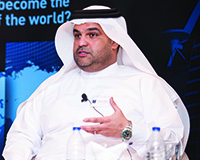
But more than buildings, agreed the panel, the UAE’s future success will be determined by people. “One of the biggest challenges most of the world is facing is attracting and keeping talented people,” said TECOM’s Al Gergawi (pictured right). “How do you tap into talent and creative people, and how do you bring people here?”
Dubai: host of the 2020 World Expo
The United Arab Emirates is to host the World Expo in Dubai in 2020, the first time it will be staged in the Middle East, north Africa and south Asia region. The event may not be seared on the national consciousness in many developed countries, but it’s a big deal in the UAE.
“The themes of the Expo are around sustainability, growth in knowledge and mobility,” said Anita Mehra of Dubai Airports Group. “We need to improve levels of education, and get more people here who have the knowledge, who want to stay here and who want to contribute to the economy here. On sustainability, we want our carbon footprint to be something we can brag about, something to give us a better standard of living, so that we can be a role model for the rest of the world.”
For Al Gergawi the UAE should be looking beyond the event too. “The next challenge is beyond 2020,” he said. “What are we going to do to sustain this growth beyond 2020? What’s the next event we’re going to host? How are we going to deliver more sustainable development? This is the next challenge.”
The state of Dubai’s property markets
Dubai has seen stellar highs and dark depths in the past decade. How healthy are the emirate’s residential, commercial, retail and logistics markets today?
“For residential, I think we’re okay,” said Cluttons’ Morgan. “We are looking at some plateaued growth over the next 18 months. Having said that, we’re still seeing a percentage increase of 2%, 3%, 4%, which, by any other global measure, is a good return annually on residential real estate.
“The commercial market, in terms of office space, has definitely come back over the past six months. Demand has increased. But what is available on the market doesn’t necessarily fit the demand, and I think there’s a challenge there.
“Retail is going from strength to strength. You could argue that we’re massively over-retailed. You can’t use any normal economic retail barometer when you look at Dubai, because it uses retail completely differently.
“And industrial logistics, I think there’s a very interesting dynamic. We’ve got the ports, the airports, the Etihad rail potentially opening up into Saudi Arabia. That’s a very exciting segment of the market.”







